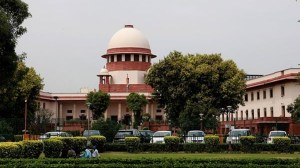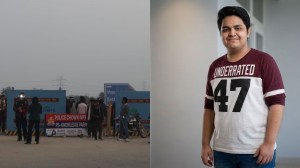Save Hinduism from Hindus
It is time for the average Hindu to reclaim his religion from the madness being unleashed in its name by the VHP and the RSS. The most rece...

It is time for the average Hindu to reclaim his religion from the madness being unleashed in its name by the VHP and the RSS.
The most recent complaint against India8217;s Muslims, namely, that they did not accept the Shankaracharya8217;s 8216;8216;reasonable offer8217;8217; is absurd. The Kanchi Shankaracharya, true to his reputation, had started out in earnest 8212; to engage in dialogue, to take and to give. But what was offered in the end, under relentless pressure from the VHP, was quite egregious. The Hindus would make no concessions 8212; not on Kashi, not on Mathura. And the Muslims would gift the disputed land in Ayodhya to the Hindus.
But this makes a travesty of the term 8216;8216;gift8217;8217;. You can urge your own side to give away something. But asking the other side to gift something to you is a misuse of the word. And when that something happens to be land, created by the illegal demolition of a mosque, this amounts to taking a person hostage and then asking him to 8216;8216;gift8217;8217; his watch to you.
This Ayodhya deadlock is just one in a line of events, beginning with the 1992 destruction of the Babri Masjid and continuing with the massacre in Gujarat, and the bending of the law to protect its perpetrators. Not only are these events morally wrong, they do great harm, ironically, to Hinduism itself.
Writing in the middle of the 19th century, Karl Marx had marvelled at the quiet robustness of Hindu civilisation. It would take blow after blow of invasions, the economy would shatter, the buildings break; but no sooner had the dust from the invading cavalry settled, it would become clear that Hinduism was intact, almost unchanged.
In some ways, it is also a religion of unrivalled openness. There is no central command that sets the rules of what a Hindu may or may not do. One can violate its rituals and still legitimately claim to be a Hindu. One can be an atheist and a Hindu, as was the sage Carvaka.
Aggression towards minorities, as are being preached by the VHP, is unbecoming of this great tradition. To whip up emotions by stoking fears that Hinduism is endangered and will perish unless it defends itself aggressively is to reveal an inferiority complex for which there is no basis.
The inclination to use the State to ban conversion is founded in this same complex and a failure to understand that Hinduism may not be loud, strident and proselytising, but it is strong. It faces no risk, except from its own fundamentalists, who, by imitating other fundamentalists, are for the first time threatening to change the very character of this ancient religion.
And while on this subject, I must add my own belief that, even if it were an endangered religion, there would be no moral reason to ban conversion. Religion is a personal matter. People should be free to preach; and if someone, as a consequence of this or simply because he is dissatisfied with his own religion, wants to switch to another faith, then so be it.
Hindus have often treated their own sub-groups poorly. 8216;8216;To the Untouchables, Hinduism is a veritable chamber of horrors,8217;8217; wrote India8217;s most famous Untouchable, B.R. Ambedkar. He argued that Hinduism, as practiced, was 8216;8216;inconsistent with the self-respect and honour of the Untouchables8217;8217; and that this 8216;8216;justifies their conversion8217;8217;. Ambedkar himself converted to Buddhism three weeks before his death on December 6, 1956.
If such conversions are thought to be offensive, then the lesson must be to reform the practices within Hinduism that lead to them, instead of using the State to block exit routes.
It is time the BJP government dissociates itself from the VHP-RSS combine. I know it is naive to expect politicians to live entirely by their morals. To be able to do what a politician wants to do, he needs to be in power, and this often necessitates compromises.
But at the same time even politicians must draw a line and decide that, beyond a point, it is better to lose an election than to be held hostage by a small fanatical group that has no respect for the law. The VHP has made it clear that if the ASI excavations yield no evidence of a temple, it will ignore the ASI; and if the Supreme Court does not rule in favour of a temple, it will use mass movement to counter the verdict.
One of the critical ingredients of a thriving economy is the rule of law. For the BJP government, this is a good occasion to drive this point home. A tragedy of this government is that it is spending too little time on things that matter like creating prosperity for the people and too much time on 8216;8216;politics8217;8217;. For a nation as poor as ours, the pressing need is to enhance growth, create employment and curb corruption.
India can achieve a growth rate of eight per cent per annum; it is in a position now to eradicate poverty. However, this will need determination, brainpower and time on the part of government to crafting and enforcing good economic policies. Our government is unfortunately so preoccupied with zero-sum political conflicts 8212; Ayodhya, conversions, cow-slaughter, resurrection of Vedic Studies 8212; that it is ignoring policies that can make a real difference to the lives of its citizens.
It needs to put Ayodhya behind it as quickly as possible. If its current stance is making an early resolution so difficult, I suggest that it tries what is only a slight modification of the venerable Shankaracharya8217;s plan. Ask the Hindus to gift the land where the Babri Masjid once stood to the Muslims.
8212; The writer is professor of economics at Cornell University and visiting professor at the Delhi School of Economics
- 01
- 02
- 03
- 04
- 05































